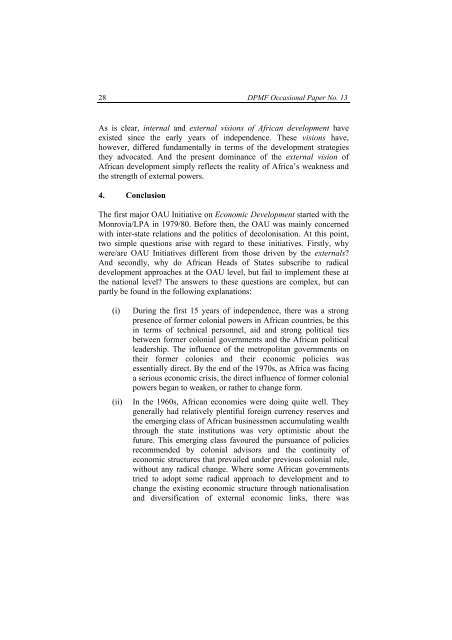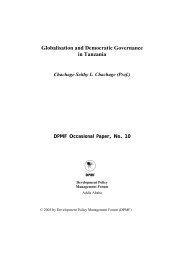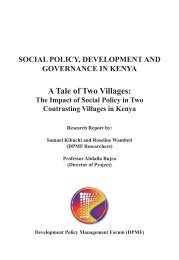From the Lagos Plan of Action (LPA) - DPMF.org
From the Lagos Plan of Action (LPA) - DPMF.org
From the Lagos Plan of Action (LPA) - DPMF.org
You also want an ePaper? Increase the reach of your titles
YUMPU automatically turns print PDFs into web optimized ePapers that Google loves.
28 <strong>DPMF</strong> Occasional Paper No. 13As is clear, internal and external visions <strong>of</strong> African development haveexisted since <strong>the</strong> early years <strong>of</strong> independence. These visions have,however, differed fundamentally in terms <strong>of</strong> <strong>the</strong> development strategies<strong>the</strong>y advocated. And <strong>the</strong> present dominance <strong>of</strong> <strong>the</strong> external vision <strong>of</strong>African development simply reflects <strong>the</strong> reality <strong>of</strong> Africa’s weakness and<strong>the</strong> strength <strong>of</strong> external powers.4. ConclusionThe first major OAU Initiative on Economic Development started with <strong>the</strong>Monrovia/<strong>LPA</strong> in 1979/80. Before <strong>the</strong>n, <strong>the</strong> OAU was mainly concernedwith inter-state relations and <strong>the</strong> politics <strong>of</strong> decolonisation. At this point,two simple questions arise with regard to <strong>the</strong>se initiatives. Firstly, whywere/are OAU Initiatives different from those driven by <strong>the</strong> externals?And secondly, why do African Heads <strong>of</strong> States subscribe to radicaldevelopment approaches at <strong>the</strong> OAU level, but fail to implement <strong>the</strong>se at<strong>the</strong> national level? The answers to <strong>the</strong>se questions are complex, but canpartly be found in <strong>the</strong> following explanations:(i)(ii)During <strong>the</strong> first 15 years <strong>of</strong> independence, <strong>the</strong>re was a strongpresence <strong>of</strong> former colonial powers in African countries, be thisin terms <strong>of</strong> technical personnel, aid and strong political tiesbetween former colonial governments and <strong>the</strong> African politicalleadership. The influence <strong>of</strong> <strong>the</strong> metropolitan governments on<strong>the</strong>ir former colonies and <strong>the</strong>ir economic policies wasessentially direct. By <strong>the</strong> end <strong>of</strong> <strong>the</strong> 1970s, as Africa was facinga serious economic crisis, <strong>the</strong> direct influence <strong>of</strong> former colonialpowers began to weaken, or ra<strong>the</strong>r to change form.In <strong>the</strong> 1960s, African economies were doing quite well. Theygenerally had relatively plentiful foreign currency reserves and<strong>the</strong> emerging class <strong>of</strong> African businessmen accumulating wealththrough <strong>the</strong> state institutions was very optimistic about <strong>the</strong>future. This emerging class favoured <strong>the</strong> pursuance <strong>of</strong> policiesrecommended by colonial advisors and <strong>the</strong> continuity <strong>of</strong>economic structures that prevailed under previous colonial rule,without any radical change. Where some African governmentstried to adopt some radical approach to development and tochange <strong>the</strong> existing economic structure through nationalisationand diversification <strong>of</strong> external economic links, <strong>the</strong>re was




